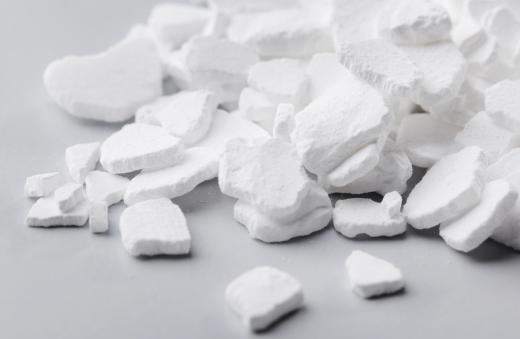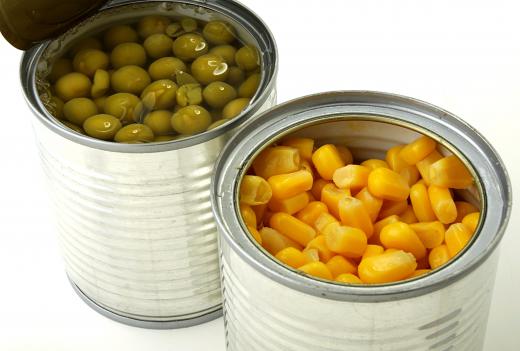What is Calcium Chloride?
 Malcolm Tatum
Malcolm Tatum
One of the several different forms of salt, calcium chloride is a solid that is capable of absorbing a great deal of liquid. There are many different uses for this type of salt, including such diverse applications as removing ice from roadways to preserving commercially canned foods. While helpful in many ways, consumption of large amounts of this substance can lead to a great deal of gastronomical distress.
There is more than one way to produce calcium chloride for commercial use. One approach is to extract the salt from limestone. Today, much of the product used is created as by-products from other sorts of processing. This by-product can be used for so many of the same applications as sodium chloride, commonly known as rock salt, causing the two to often be confused.

The ability of calcium chloride to absorb a great deal of liquid is one of the qualities that make it so versatile. For example, this product works much more efficiently than rock salt when it comes to clearing snow and ice from sidewalks, streets, and roadways. This is particularly true at lower temperatures. There are some drawbacks with this application, since there is some evidence that the product may be more harmful to live plants than rock salt.

Many pools utilize products containing calcium chloride, especially in areas where there is relatively little calcium found in the water. Use of this product helps to increase the calcium content of the water, which in turn minimizes the potential for corrosion on the pumps. The products also limit corrosion with various types of pool equipment, as well as any pool fittings that are made with metal.

This substance is also used in a number of other applications. For example, sprinkling the product on roads in arid climates, especially deserts, can help to minimize the amount of dust that is kicked up due to traffic. The product can be used to dry kelp, thus aiding in the production of soda ash. It can be used as an ingredient in different types of plastic products, as well as helping to thin liquid fabric softeners.

The preservative effects of calcium chloride also make it useful for food preparation and storage. Limited amounts can be used as electrolytes in various types of sports drinks, providing a salty taste that helps offset some of the heavy sweetness of these products. When it comes to canned fruit and vegetables, the use of calcium chloride helps the food to remain solid even when packed in liquids. Many pickle manufacturers use this type of salt to add taste without actually increasing the amount of salt required to achieve the desired flavor.
AS FEATURED ON:
AS FEATURED ON:
















Discussion Comments
Calcium chloride is a bi-product of the petroleum industry. It is left over when they crack long chain hydrocarbons (like diesel) into gas. The US exports more finished gasoline each day than we use so: high diesel prices and lots of calcium chloride to get rid of it, and of course, lots of air pollution!
Look at the ingredients in your food. Six or seven years ago C.C. wasn't in our food and we did export finished gasoline. Funny how that works. I would say maybe this industrial waste (by-product) is cheaper than salt. (FYI: calcium chloride is a salt, just not the salt (sodium chloride))
FDA approved means: Until we tell you otherwise, it should never be used as a statement such as: It's safe for your health!
It's safe for the human body in 'limited amounts,' but what happens when a large majority of food manufacturers start adding it and then it's in everything we consume?
The FDA approves the low amount that is in that one product, not taking into account all the other food and drink ingested in a day. If a person consumes several products a day all with calcium chloride as an additive (instead of sodium chloride) - then what? The FDA needs to change their standards to account for the trend for every additive.
So why is it added to supposedly spring water to enhance the flavor? I purchase spring water to get the natural minerals not something added. It seems some of the bottled water is no better for us than the tap water with chlorine and fluoride.
Is the calcium made from oyster shell? The reason I ask is because I ate some pickles with calcium chloride listed as an ingredient and I had the same bad allergic reaction as if I had eaten shellfish.
I found this ingredient listed in my walkers crisps and that leads me to here and I find out it's used for pools and pool equipment and that's in our food and drink? What the hell is going on here?
My advice for today: Don't eat meat or anything with soy/a and soya oil and that also means soya milk
or anything with aspartame. You have been warned.
As the article states, some calcium chloride formulas used for clearing roads and keeping pool water clean can be heavily corrosive, not only to plants, but also to skin. If you do use it in your pool or to clear ice from your sidewalk, try to use only as much as needed, and avoid excess exposure.
While it can have many benefits, like other kinds of sodium, calcium chloride should be consumed in moderate amounts. The rise of sports drinks and other special "water" for athletes has led many people to consume too much extra salt and sugar when they exercise. Not only is this expensive, but it can actually derail the diet goals that often inspired people to exercise and use these drinks in the first place.
Post your comments